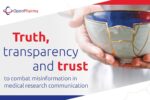This week, we read about the targets and strategies for addressing climate change of the 20 largest pharma companies. We learn about sharing data using data commons, about open science in Africa, and about what is going on at NASA in terms of open-source software and open science. We highlight the opening of the 2023 ASAPbio fellowship programme, the University of Liverpool’s 2023 Open Research Week, and the announcement of the dates of the OASPA 2023 annual conference. Finally, we listen to a podcast on the growth of open science and open data in research institutes around the world.
To read:
Pharma company targets and strategies to address climate change via MDPI | 30-minute read
Climate change is undoubtedly one of the biggest issues of the 21st century and affects every sector, including healthcare, which is estimated to produce 4–5% of national greenhouse gas emissions. This includes pharma companies: various studies have estimated that pharma’s contribution to healthcare-related greenhouse gas emissions is anywhere between 10% and 55%. This paper, written in collaboration between Oxford PharmaGenesis and the Nuffield Department of Primary Care Health Sciences at the University of Oxford, looked at the climate change targets of the 20 largest pharma companies, as well as their current greenhouse gas emissions and the strategies that are, or could be, implemented to reduce their emissions.
Data sharing with data commons via Scientific Data | 15-minute read
Data commons are cloud-based platforms that allow researchers to manage, analyse and share their data. This article, written by Robert L Grossman (Professor in Medicine and Computer Science at the University of Chicago) and published in Scientific Data, shares 10 key lessons for sharing data using a data commons. The paper also discusses how data commons differ to data repositories and virtual research environments, and also highlights the success of the National Cancer Institute’s Genomic Data Commons.
Results from African workshops and surveys on open science via PLOS | 4-minute read
PLOS, alongside the Association of African Universities and the Training Centre in Communication, have been running a series of workshops with Presidents, Vice Chancellors, Rectors and other senior leaders from higher education institutions in Africa. These workshops have focused on promoting education and awareness about the benefits of open science, especially open access publishing, in Africa. Now, the results of surveys conducted during the first two workshops have been released. You can read all the results from these workshops here!
One giant leap for open science: NASA and open science via The New Stack | 4-minute read
The National Aeronautics and Space Administration (NASA) has a rich history of engagement with open science, most notably through its use of open source software, such as F Prime, for space missions, as well as providing software data repositories for public access. These repositories include code.nasa.gov, the Science Discovery Engine, and NASA’s github page. Now, NASA is funding the development of new open-source software, having provided $3 million to 22 different open source projects in the past 2 years. This blog post dives into NASA’s relationship with open science and open source, and looks at what NASA has planned for the future.
To engage with:
Become a preprint expert and advocate: 2023 ASAPbio fellowships are open via ASAPbio
Applications are now open for the 2023 ASAPbio fellowships, which will run from April to November. ASAPbio have been running their preprint Fellows programme since 2020, with the aim of promoting engagement with preprints. These fellowships allow those with an interest in open science to learn more about preprints, to improve the use of preprints in the research community, and to convert more preprint naysayers to the cause. The application window closes on 24 March 2023, so apply now!
Don’t miss the final few days of Open Research Week 2023! via University of Liverpool
The University of Liverpool have been hosting their 5th Open Research Week over the past week. With events running until 15 March, there are still a number of events that you can attend! These include sessions discussing open data and data journals, open research at smaller institutions, reproducibility and open research, and more. These sessions are free, but registration is required.
Save the date: the OASPA 2023 annual conference via OASPA
The Open Access Scholarly Publishing Association (OASPA) has announced the dates for its 2023 conference. This conference, which will take place entirely virtually, will be held between 19 and 21 September 2023. OASPA will release further details about registration and the programme in the coming months.
To listen to:
A new normal: open science and data via Spotify | 30-minute listen
Join the Research in Action podcast with their special guest Hilary Hanahoe, who is the Secretary General of the Research Data Alliance (RDA). In this episode, you can learn about how open science and open data practices are growing in research institutions across the globe, and about some of the biggest challenges and benefits of open science. The podcast also evaluates how industry players, such as Oracle for Research (a member of the RDA), are helping to enhance open science practices globally. You can listen to all the other Research in Action episodes here.
Have you read the December 2022 issue of Medical Writing about Open Science and Open Pharma? Read the full issue here!


![[[A close-up view of a traditional printing press in operation, showing metal type and inked rollers in motion as printed material is prepared.]]](https://www.openpharma.blog/wp-content/uploads/2025/12/16Dec25-150x100.jpg)



